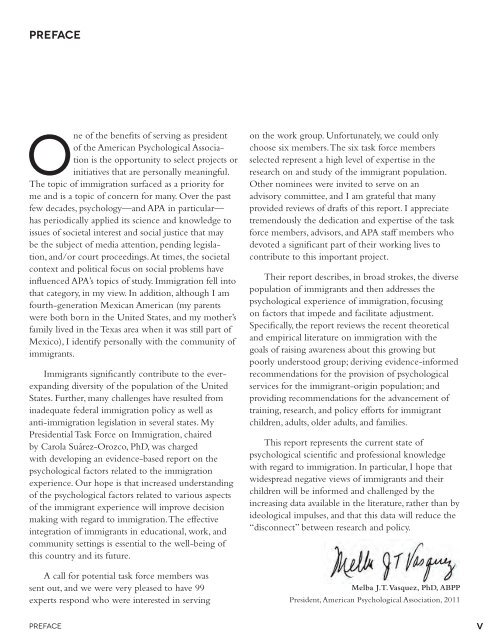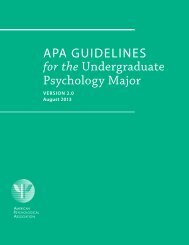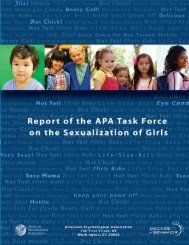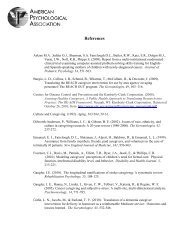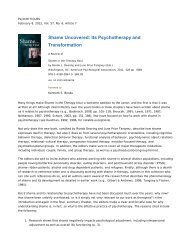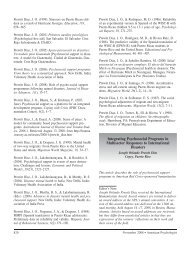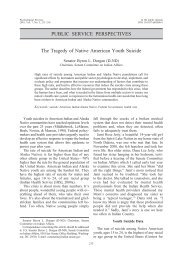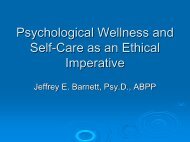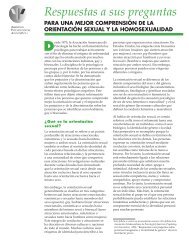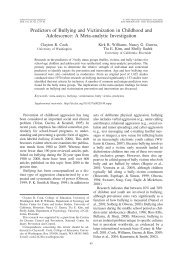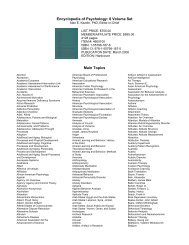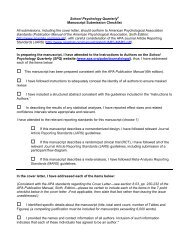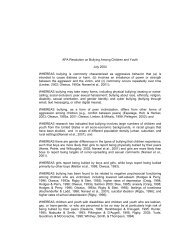Crossroads: The Psychology of Immigration in the New Century
Crossroads: The Psychology of Immigration in the New Century
Crossroads: The Psychology of Immigration in the New Century
You also want an ePaper? Increase the reach of your titles
YUMPU automatically turns print PDFs into web optimized ePapers that Google loves.
Preface<br />
One <strong>of</strong> <strong>the</strong> benefits <strong>of</strong> serv<strong>in</strong>g as president<br />
<strong>of</strong> <strong>the</strong> American Psychological Association<br />
is <strong>the</strong> opportunity to select projects or<br />
<strong>in</strong>itiatives that are personally mean<strong>in</strong>gful.<br />
<strong>The</strong> topic <strong>of</strong> immigration surfaced as a priority for<br />
me and is a topic <strong>of</strong> concern for many. Over <strong>the</strong> past<br />
few decades, psychology—and APA <strong>in</strong> particular—<br />
has periodically applied its science and knowledge to<br />
issues <strong>of</strong> societal <strong>in</strong>terest and social justice that may<br />
be <strong>the</strong> subject <strong>of</strong> media attention, pend<strong>in</strong>g legislation,<br />
and/or court proceed<strong>in</strong>gs. At times, <strong>the</strong> societal<br />
context and political focus on social problems have<br />
<strong>in</strong>fluenced APA’s topics <strong>of</strong> study. <strong>Immigration</strong> fell <strong>in</strong>to<br />
that category, <strong>in</strong> my view. In addition, although I am<br />
fourth-generation Mexican American (my parents<br />
were both born <strong>in</strong> <strong>the</strong> United States, and my mo<strong>the</strong>r’s<br />
family lived <strong>in</strong> <strong>the</strong> Texas area when it was still part <strong>of</strong><br />
Mexico), I identify personally with <strong>the</strong> community <strong>of</strong><br />
immigrants.<br />
Immigrants significantly contribute to <strong>the</strong> everexpand<strong>in</strong>g<br />
diversity <strong>of</strong> <strong>the</strong> population <strong>of</strong> <strong>the</strong> United<br />
States. Fur<strong>the</strong>r, many challenges have resulted from<br />
<strong>in</strong>adequate federal immigration policy as well as<br />
anti-immigration legislation <strong>in</strong> several states. My<br />
Presidential Task Force on <strong>Immigration</strong>, chaired<br />
by Carola Suárez-Orozco, PhD, was charged<br />
with develop<strong>in</strong>g an evidence-based report on <strong>the</strong><br />
psychological factors related to <strong>the</strong> immigration<br />
experience. Our hope is that <strong>in</strong>creased understand<strong>in</strong>g<br />
<strong>of</strong> <strong>the</strong> psychological factors related to various aspects<br />
<strong>of</strong> <strong>the</strong> immigrant experience will improve decision<br />
mak<strong>in</strong>g with regard to immigration. <strong>The</strong> effective<br />
<strong>in</strong>tegration <strong>of</strong> immigrants <strong>in</strong> educational, work, and<br />
community sett<strong>in</strong>gs is essential to <strong>the</strong> well-be<strong>in</strong>g <strong>of</strong><br />
this country and its future.<br />
A call for potential task force members was<br />
sent out, and we were very pleased to have 99<br />
experts respond who were <strong>in</strong>terested <strong>in</strong> serv<strong>in</strong>g<br />
PREFACE<br />
on <strong>the</strong> work group. Unfortunately, we could only<br />
choose six members. <strong>The</strong> six task force members<br />
selected represent a high level <strong>of</strong> expertise <strong>in</strong> <strong>the</strong><br />
research on and study <strong>of</strong> <strong>the</strong> immigrant population.<br />
O<strong>the</strong>r nom<strong>in</strong>ees were <strong>in</strong>vited to serve on an<br />
advisory committee, and I am grateful that many<br />
provided reviews <strong>of</strong> drafts <strong>of</strong> this report. I appreciate<br />
tremendously <strong>the</strong> dedication and expertise <strong>of</strong> <strong>the</strong> task<br />
force members, advisors, and APA staff members who<br />
devoted a significant part <strong>of</strong> <strong>the</strong>ir work<strong>in</strong>g lives to<br />
contribute to this important project.<br />
<strong>The</strong>ir report describes, <strong>in</strong> broad strokes, <strong>the</strong> diverse<br />
population <strong>of</strong> immigrants and <strong>the</strong>n addresses <strong>the</strong><br />
psychological experience <strong>of</strong> immigration, focus<strong>in</strong>g<br />
on factors that impede and facilitate adjustment.<br />
Specifically, <strong>the</strong> report reviews <strong>the</strong> recent <strong>the</strong>oretical<br />
and empirical literature on immigration with <strong>the</strong><br />
goals <strong>of</strong> rais<strong>in</strong>g awareness about this grow<strong>in</strong>g but<br />
poorly understood group; deriv<strong>in</strong>g evidence-<strong>in</strong>formed<br />
recommendations for <strong>the</strong> provision <strong>of</strong> psychological<br />
services for <strong>the</strong> immigrant-orig<strong>in</strong> population; and<br />
provid<strong>in</strong>g recommendations for <strong>the</strong> advancement <strong>of</strong><br />
tra<strong>in</strong><strong>in</strong>g, research, and policy efforts for immigrant<br />
children, adults, older adults, and families.<br />
This report represents <strong>the</strong> current state <strong>of</strong><br />
psychological scientific and pr<strong>of</strong>essional knowledge<br />
with regard to immigration. In particular, I hope that<br />
widespread negative views <strong>of</strong> immigrants and <strong>the</strong>ir<br />
children will be <strong>in</strong>formed and challenged by <strong>the</strong><br />
<strong>in</strong>creas<strong>in</strong>g data available <strong>in</strong> <strong>the</strong> literature, ra<strong>the</strong>r than by<br />
ideological impulses, and that this data will reduce <strong>the</strong><br />
“disconnect” between research and policy.<br />
melba J.T. Vasquez, PhD, aBPP<br />
President, American Psychological Association, 2011<br />
v


